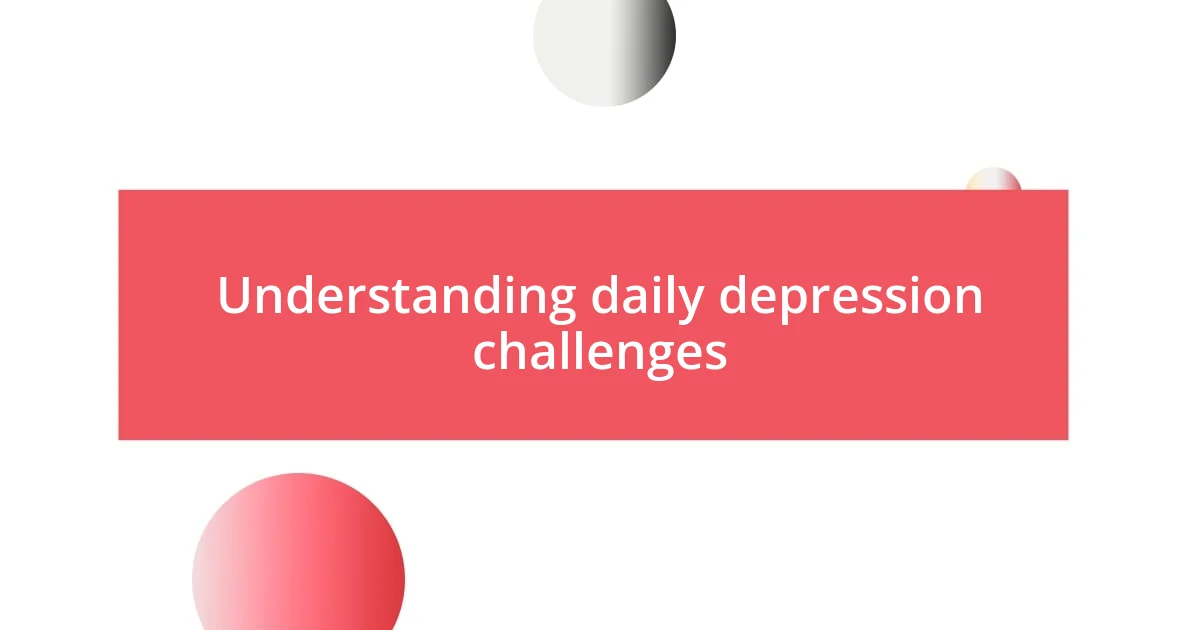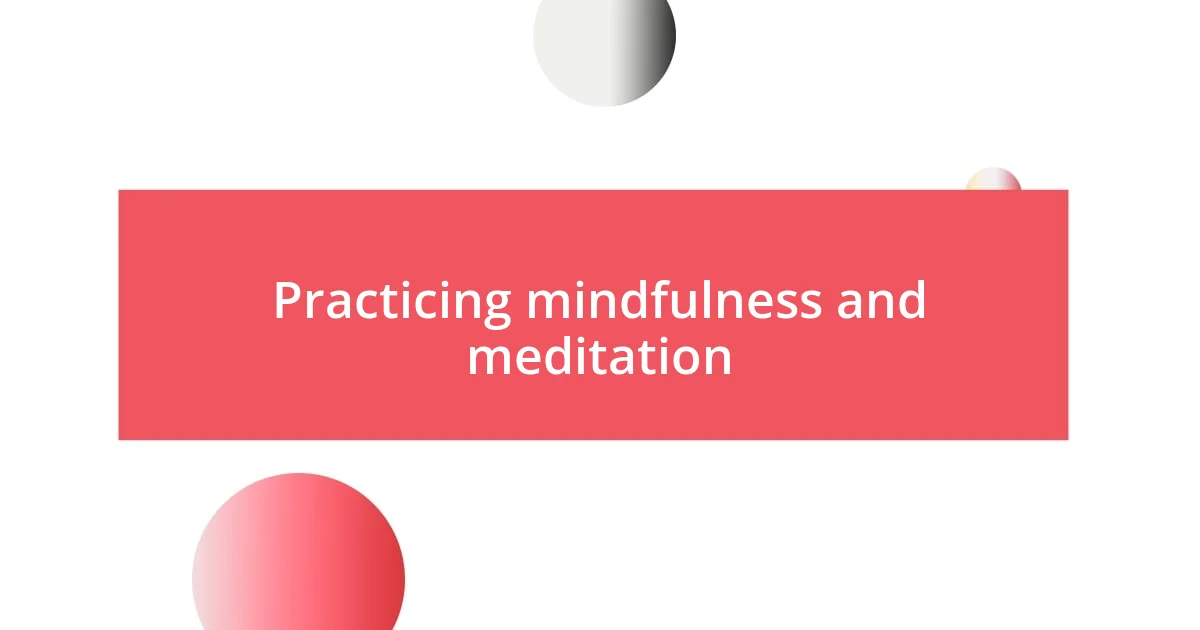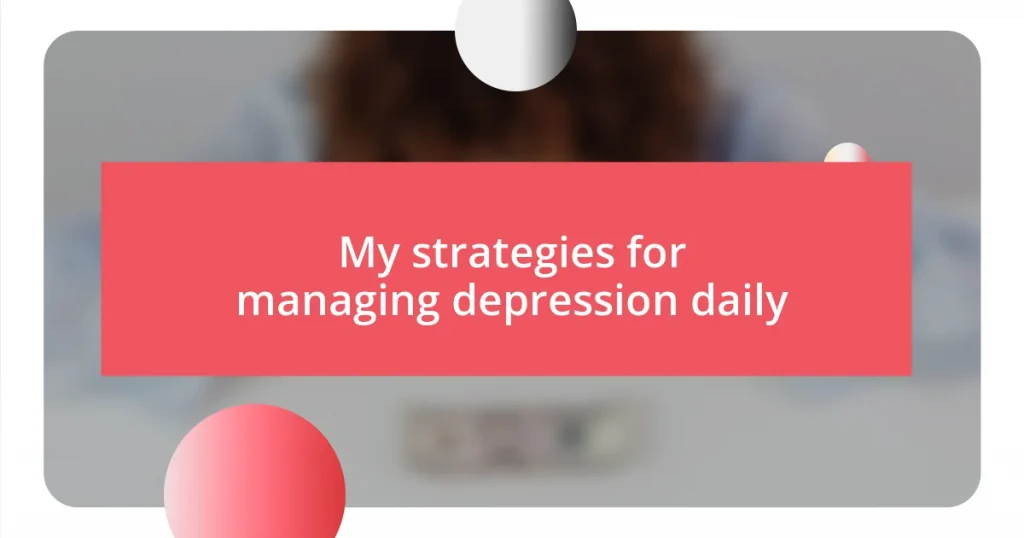Key takeaways:
- Establishing a supportive routine, including consistent wake-up times and a comforting environment, significantly enhances daily mental health.
- Incorporating physical activity, even in small doses, can shift mood and alleviate feelings of depression by promoting movement and mindfulness.
- Nurturing social connections and utilizing professional resources, such as therapy and journaling, are essential for emotional support and personal growth.

Understanding daily depression challenges
Living with daily depression can feel like traversing a foggy landscape where motivation often evades you. I remember mornings when the bed felt like a gravitational pull, making it nearly impossible to rise. How do you summon the energy to face the day when every task feels monumental?
One of the challenges I often encounter is the relentless cycle of negative thoughts that can derail even the simplest of tasks. It’s disheartening when I catch myself thinking, “Why bother?” at moments when I should feel hopeful. Have you ever found yourself stuck in a loop of self-doubt, wondering if things will ever change?
On some days, just stepping outside can feel like a Herculean effort. I recall a time when I forced myself to take a short walk, only to be met with feelings of inadequacy as I watched others going about their day with ease. It’s tough to reconcile that I can feel so isolated in a crowd; don’t you sometimes wonder why our struggles can seem invisible to those around us?

Establishing a supportive routine
Establishing a supportive routine has been a game-changer for me in managing daily depression. For example, I found that having a consistent wake-up time sets a positive tone for the day. I try to include activities that I genuinely enjoy, like a few minutes of reading or a cup of my favorite tea. These small rituals are like gentle nudges that remind me I’m taking care of myself.
I also realize that flexibility is essential in this routine. Some days, the weight of depression makes even simple tasks overwhelming. On those tougher days, I allow myself to scale back my plans. I might swap a 30-minute workout for just stretching on the floor—it’s a small victory, but it still counts toward my mental health. Have you noticed that even tiny adjustments can make a significant difference in how you feel?
Creating a supportive environment is equally important. I like to make my space comforting with soft lighting and calming scents. It’s as if I’m inviting positivity to step in, countering the heaviness that often lingers. Sharing this space with a pet, for example, has brought immense joy and companionship. Have you ever considered how your surroundings influence your mood?
| Activity | Impact on Mood |
|---|---|
| Consistent Wake-Up Time | Sets a stable foundation for the day |
| Flexible Task Adjustment | Reduces pressure and promotes self-compassion |
| Creating a Comforting Environment | Encourages a positive mental atmosphere |

Incorporating physical activity

Incorporating physical activity
Incorporating physical activity into my daily life has been transformative in battling the fog of depression. I remember feeling like the world was closing in on me, and taking just a short walk around my neighborhood felt like breaking free. Those moments of movement, however small, shifted something inside me, making the heaviness feel a little lighter. It’s fascinating how getting your body moving can help to clear your mind too—almost like a reset button for my mood!
I try to find ways to weave movement into my day without it feeling like a chore. Here are some strategies that work for me:
- **Short Walks**: Just 10 minutes outside can freshen my perspective.
- **Dancing**: Popping on my favorite tunes and dancing around my living room can lift my spirits almost instantly.
- **Stretching**: Even a few stretches in the morning can help wake up not just my body but my mind too.
- **Yoga**: Joining an online yoga session feels like a mix of fitness and mindfulness, balancing my body and soul.

Practicing mindfulness and meditation
Practicing mindfulness and meditation has become a cornerstone in my daily routine. I remember the first time I sat silently for just five minutes; at first, my mind raced with thoughts, but gradually, I found clarity in the chaos. This simple act, even for a short time, helped me anchor my emotions, making it easier to navigate the day’s challenges. Have you ever noticed how taking a moment to breathe deeply can shift your entire perspective?
During my meditation sessions, I focus on my breath. It feels almost magical—each inhale brings in calm, and each exhale releases tension. I often visualize a wave washing over me, carrying away worries. There are days when my thoughts wander, but I’ve learned that it’s part of the process. Instead of getting frustrated, I gently guide my mind back to my breath. This practice has taught me self-compassion, showing me that it’s okay to not have it all together.
Mindfulness extends beyond meditation; it seeps into how I approach daily activities. Cooking, for instance, transforms into a mindful practice where I fully engage my senses with every chop of the vegetable or sizzle in the pan. It reminds me to be present, and in those moments, I can almost forget the weight of depression. Have you tried to embrace mindfulness in everyday tasks? You might be surprised at the peace it can bring!

Nurturing social connections
Nurturing social connections is vital for maintaining mental well-being. I vividly recall a time when I felt isolated, almost like I was a ghost in my own life. Reaching out to a friend and sharing my feelings opened a door I didn’t even know was there. That simple phone call reminded me how important it is to keep those connections alive, especially during tough times. Have you ever felt that spark of warmth from just talking to someone who understands?
I make a conscious effort to check in with friends and family regularly, even if it’s just a quick text or a funny meme. These small gestures help me feel less alone, almost as if we’re sharing a little piece of our lives every day. There are days when it feels like such a task, but then I remind myself of the joy in connection. It’s fascinating how quickly a laughter-filled conversation can shift my mood, isn’t it? Just knowing that there are people out there who care can make a world of difference.
Group activities, like book clubs or sports leagues, have also been game-changers for me. I remember joining a local walking group, and at first, I felt hesitant. But with each step alongside new friends, my worries started to fade, replaced by shared stories and laughter. That sense of belonging lifted a weight off my shoulders that I didn’t even realize I was carrying. How have your social activities impacted your mental health? Because for me, they’ve become an essential part of my daily routine, providing not just joy but also a sense of community.

Utilizing professional resources
Utilizing professional resources has significantly influenced my journey with depression. When I first sought therapy, I was filled with apprehension—would it really help? But that initial session, filled with candid conversations and genuine support, was a revelation. My therapist introduced techniques that I never thought would make a difference, like cognitive-behavioral strategies that reshaped how I perceive challenges. Have you ever felt that something as simple as a conversation could unravel years of bottled emotions?
I remember a time when I was overwhelmed by negative thoughts, creating a spiral that felt impossible to escape. It was then that my therapist suggested journaling to map out those emotions. As I spilled my feelings onto the page, I realized it wasn’t just about writing; it was a powerful tool for understanding and processing my thoughts. This practice transformed my perspective, helping me see patterns and triggers that once seemed invisible. Honestly, how often do we dismiss the power of our own words?
Medication, too, has played a role in my management plan. I was hesitant at first, fearing the side effects and the stigma surrounding it. However, after consulting with a psychiatrist, I found a balance that eased my daily struggles. It taught me that asking for help doesn’t mean I’m weak; it means I’m taking control. Have you considered how professional guidance could pave a smoother path through your own challenges? Seeking help is a courageous step that can lead to profound transformations in our lives.

Evaluating progress and adjusting strategies
Evaluating progress in managing depression requires a deliberate and honest reflection on what strategies work best for me. I often set aside a quiet moment each week to journal about my feelings and the effectiveness of my current tactics. It’s akin to checking in with myself—almost like asking, “How am I really doing?” This simple assessment may reveal surprises, such as discovering that meditation has become a comforting refuge while other strategies fell short. Have you ever noticed how re-evaluating your approach can illuminate unexpected paths toward relief?
Adjusting strategies based on this self-assessment has proven essential. I remember a particularly challenging month when my usual routine felt stale, leaving me more drained than uplifted. That’s when I decided to shake things up—experimenting with different activities like art therapy and even attending a local support group. It was enlightening to see how a fresh perspective could not only boost my mood but also foster new connections. How has exploring new avenues influenced your own mental landscape?
As I adapt my approach, I also pay close attention to external factors affecting my mental health. Changes in my environment can impact my mood in ways I hadn’t anticipated. For example, when I switched my workspace to a sunnier spot in my home, it significantly enhanced my focus and energy. It’s funny how something so simple can make a world of difference. What minor adjustments have you made in your life that brought about surprising changes to your mental well-being? Each step forward, no matter how small, can lead to a more fulfilling daily existence.















